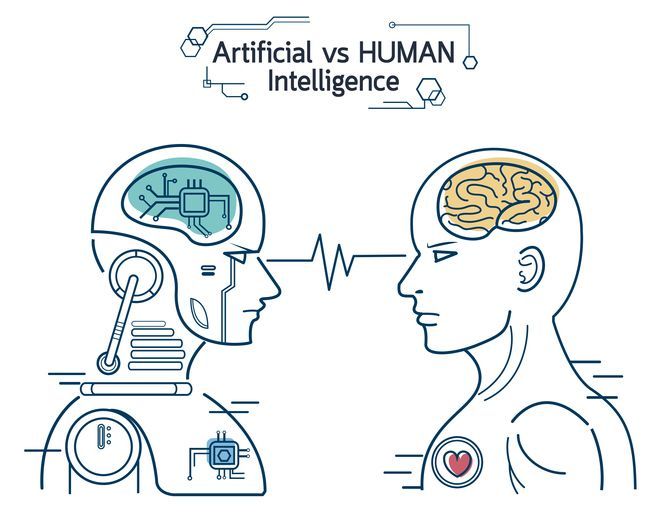
Artificial Intelligence (AI) has become a buzzword in recent years. It is transforming every aspect of our lives, from the way we work to the way we interact with each other. However, the impact of AI on human intelligence is a matter of concern. There are concerns that AI may eventually surpass human intelligence, leading to our downfall. In this blog post, we will explore the effects of AI on human intelligence, the pros and cons of AI, and recommendations for achieving a balance between human and machine intelligence.
Effects of AI🤖 on Human Intelligence 🧠:
The Impact of AI on Jobs: One of the most significant effects of AI on human intelligence is the impact on jobs. AI is automating many tasks, making certain jobs obsolete. This can lead to unemployment and a loss of human skills. However, AI is also creating new job opportunities in the field of AI development and maintenance.Reduction of Human Creativity:Another effect of AI on human intelligence is the reduction of human creativity. AI is great at performing repetitive tasks and solving problems based on data, but it lacks the creativity that humans possess. This means that AI may be able to solve problems faster, but it may not be able to think outside the box like humans can.
AI’s Ability to Make Decisions: AI is capable of making decisions based on data analysis, which is faster and more accurate than human decision-making. However, AI lacks the ability to understand human emotions and context, which is important in decision-making. This means that AI may make decisions based purely on data, without taking into account the human factor.
Pros and Cons of AI:
Pros:
Potential to Improve Quality of Life: AI has the potential to improve the quality of life in many ways, such as in healthcare and transportation. For example, AI can help doctors diagnose diseases more accurately, and self-driving cars can reduce the number of accidents on the road.Increase Efficiency: AI can automate many tasks, which can increase efficiency and productivity. This can lead to cost savings and faster results.
Cons:
Potential to Displace Workers: As mentioned earlier, AI is automating many tasks, which can lead to job displacement. This can have a negative impact on the economy and society.Loss of Human Problem Solving Skills: As AI becomes more prevalent, humans may rely on it too much and lose their problem-solving skills. This can lead to a society that is dependent on machines, rather than being able to think critically and creatively.
Recommendations for Achieving Human-Machine Balance:
It is important to achieve a balance between human and machine intelligence to ensure that AI is used to serve humanity, rather than threaten it. Here are some recommendations for achieving this balance:
Encourage STEM education: STEM education can help individuals develop skills in AI development and maintenance, which can create job opportunities.
Develop ethical guidelines for AI: Ethical guidelines can ensure that AI is developed and used in a responsible and ethical way.
Encourage human-machine collaboration: Humans and machines can work together to achieve better results. This can ensure that human skills are not lost, and machines are used to augment human intelligence.
Conclusion:
AI is transforming our world, and it has the potential to improve our lives in many ways. However, it is important to consider the impact of AI on human intelligence. While AI is great at performing repetitive tasks and solving problems based on data, it lacks the creativity, emotions, and context that humans possess. Achieving a balance between human and machine intelligence is essential to ensure that AI is used to serve humanity, rather than threaten it. By developing ethical guidelines, encouraging STEM education, and promoting human-machine collaboration, we can ensure that AI is used in a responsible and ethical way, while preserving and enhancing human intelligence.

0 Comments